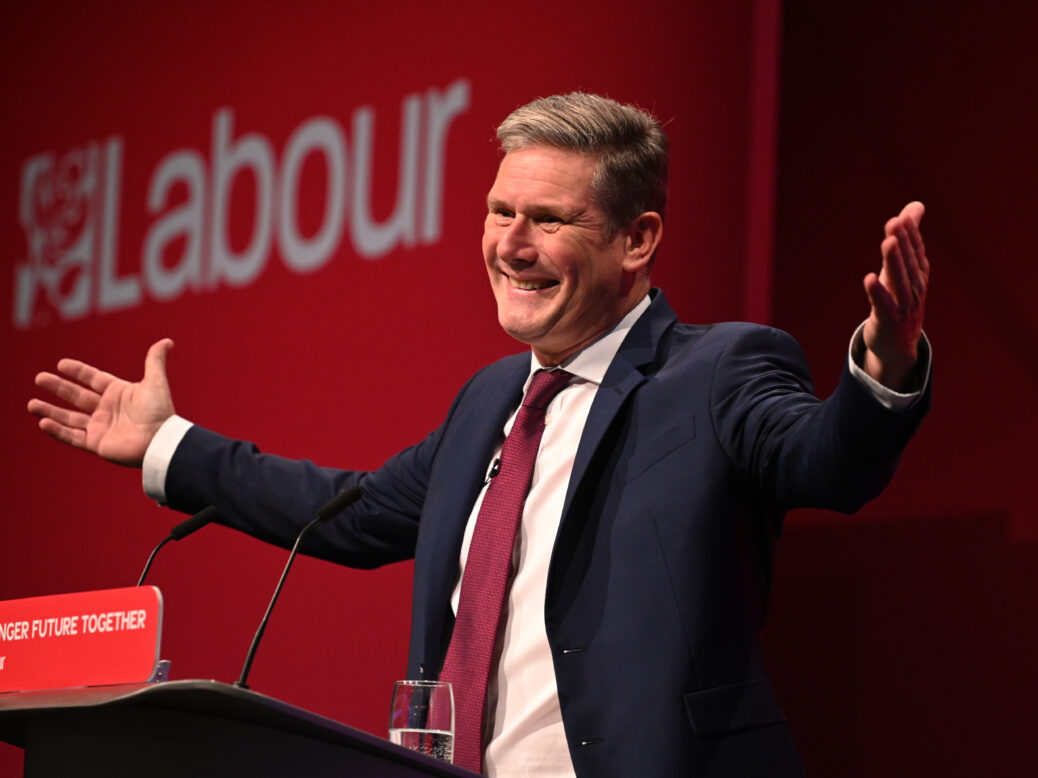
Keir Starmer’s first in-person speech to Labour Party conference was, in microcosm, the story of his leadership thus far. He started well, with a couple of big and showy gestures to demonstrate that the party is changing under his leadership (he opened by welcoming back Louise Ellman, a Jewish Labour politician who quit the party and parliament under Jeremy Corbyn’s leadership), and announcements on issues such as crime and defence, which also signal a new approach.
The speech contained a big and significant strategic choice: to make Starmer’s record and tenure as director of public prosecutions (DPP) integral to the comparison he wants to draw between himself and Boris Johnson. That could turn out to be a masterstroke, if it means the next general election becomes “career politician vs high-achieving outsider”. But it could equally turn into a disaster if the background hum of the next election concerns the ins and outs of his tenure as DPP rather than his plans for Britain in the 2020s.
When Tom Watson had to address the Labour Party conference as deputy leader after the 2017 general election, his team prepared him eight different “spontaneous” responses to audience heckles: in the end he had to use only three. Starmer’s team had also given their man a number of pre-scripted comebacks: he used only two. The visual image created on television – of a minority of hecklers being drowned out by a much larger group rising to applaud the leader – is exactly what Starmer and his team will have wanted. The applause for Ellman will have been a particular balm to Starmer: he has been determined to bring her back into the fold and was heartened to see conference delegates from across the party intervening to criticise speakers in the party’s debate on rule changes to tackle anti-Semitism.
[see also: Why Keir Starmer believes that the heckles during his Labour conference speech were “helpful”]
But then the speech went on. And on. Policy announcements were scattered like confetti for what felt like an eternity. They were all worthy centre-left pledges that might easily have adorned any Labour manifesto over the past half-century but they served little purpose. The only one that needed to be there was the reference to the party’s ambitious programme of labour market reforms. That allowed Starmer to do three things. It meant he could namecheck his deputy Angela Rayner. It served his big political argument that the British economic model doesn’t serve working people any more. And it allowed him to move on to the row about the cost of living that Labour should be having with the Conservatives over the HGV driver shortage and the looming cut to Universal Credit.
Starmer is personally very invested in the party’s ambitious policies on improving the treatment of mental health, and these are very worthy policy announcements, but they didn’t serve any particular political purpose here. They would surely have made an excellent topic for next year’s conference speech, rather than being shunted awkwardly into this one.
But the other reason why Labour are still firing policies out too fast to attract attention is poor stakeholder management: several groups in the party feel bruised and neglected and the best way to fix that is with a nod to their policy priorities in the leader’s speech.
This was a speech that showed both Starmer’s familiar strengths (that big political argument, whatever you think of its merits, is coherent, while his efforts to demonstrate change from the Corbyn era are likewise, coherent whatever you make of their merits). The speech did a good job of dispelling doubts about his ability to make a big conference address and of casting his steadiness and lack of flash as strengths, not shortcomings. But the speech also showed his familiar weaknesses: too many announcements, denied their moment to shine, made with seemingly no thought as to how they fit into the party’s big political dividing lines.
Of course, what really matters is how the speech is covered on television and on radio, and Starmer’s did enough in that crucial arena. It was well-delivered and he hit all the beats he wanted to. His criticism of Johnson as a one-trick pony echoes exactly what the Conservatives’ own focus groups are saying and that will be alarming to some in Downing Street. But they will also draw comfort from the fact that the Labour leader has yet to eliminate his most obvious weaknesses.





